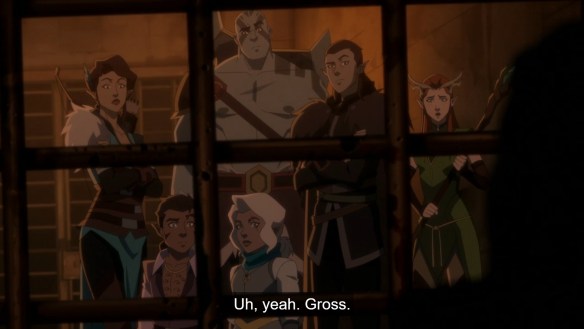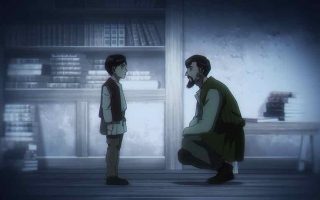Hello folks, and welcome back to Wrong Every Time. Today I’m eager to get back to the island of Glintshore, as our friends in Vox Machina have found themselves in a serious pickle. Having tracked the nefarious inventor Anna Ripley back to her remote factory, the team were divided through carelessness, with Vex’s uncertainty regarding her relationship with Percy ultimately snowballing into him suffering a seemingly fatal injury.
As grim as the situation looks, I can’t imagine our boy is actually going to die. Character death in DnD is an extraordinarily harsh cost, forcing a player to give up all the investment they’ve placed in that character both emotionally and mechanically, and asking them to start over fresh in a way that somehow integrates with the other characters’ ongoing narratives. Maintaining the threat of death in any given encounter is “realistic,” but realism and narrative drama rarely get along – if the protagonist of a novel you’re reading got unceremoniously killed by falling rocks, you’d be rightfully upset at the lack of payoff for your investment in their journey.
There is an argument to be made that random, unlikely deaths can add a certain spice to your tabletop narrative; I can see that point, but I frankly couldn’t imagine valuing such unpredictability over a certain coherency of drama. And DnD itself seems to acknowledge this issue on the far end, by providing a variety of magical methods for overcoming character death, to the point where it can actually become difficult to ensure even NPCs remain dead and buried. Thus the on-book answer is “death is common but merely inconvenient,” whereas I much prefer “death is rare but permanent.” It’s a point of contention as unresolvable as the vast array of passions players can bring to the table, answerable only to a group that has collectively affirmed they’d like to play a roguelike, or a court intrigue simulator, or simply ride a rollercoaster and slay a dragon at the end. All of these tensions are what make DnD so mercurial and fascinating, so let’s go ahead and find out how our heroes deal with this latest catastrophe!
Episode 8
We open on what appears to be a flashback to a prior Vox Machina adventure, as Grog lacks his signature beard and Scanlan’s in attendance
Yep, this is when they first met Percy, who was unsurprisingly locked in some remote jail cell when they found him
“We’re a bit short on funds, and you talk like you come from money. If we break you out, how much would it be worth?” An exceedingly Vex line of thinking – and an obvious contrast with her current character development. She learned to be pragmatic and to only care about Vax as a defensive mechanism, but working with the team has softened her, taught her to care about others more generally, even with the risks involved
“In fact, I am totally alone in the world. Perhaps you can relate.” Making an emotional bridge between their rough family lives
All he has to bargain with is his honesty, a quality that makes him seem prickly to most, but which Vex actually values
“The people of Whitestone are no strangers to loss. Grief has become our most familiar neighbor.” The unfortunate consequences of becoming a DnD party’s home base. Raising stakes and giving your players something to fight for generally demands threatening things they care about, which more often than not means the places they define as points of rest and recuperation will eventually come under enemy fire, thereby both giving the players motivation and emphasizing that nowhere is safe. It is a dangerous thing to become confidant to a party of DnD players
I continuously scaled up this “threatening the party’s home” dynamic over my last campaign – the first act concluded with their home city under attack, the second act ended with raids on half a dozen familiar cities, and the third escalated to the point where the entire subcontinent was being invaded by infernal monsters
Oh damn, we’re actually going through with a whole Percy funeral sequence!
Keeper Yennen mentions that Percy’s not religious, another weird point of contention regarding DnD character death. The game’s on-book afterlife is a mess of different gods and different hereafters, with the underlying implication that if you weren’t sworn to some god, you basically just fade into nothing. It’s a dynamic that, like many things in on-book DnD, betrays a greater interest in mechanical systems than human drama. I rewrote the game’s pantheon for my own purposes, and also streamlined its messy take on where souls go into a more coherent “cycle of ethereal energy” system
In general, while I’ve come to terms with DnD’s mechanical systems, I consider the attached worldbuilding an absolute disaster. The fiction was clearly constructed by lore enthusiasts, not storytellers, and it’s resultantly difficult to tell a satisfying on-book story
And Scanlan arrives just in time to do fuck-all about the situation
Lovely conversation between the siblings, with Vax assuring Vex that Percy knew well she loved him. If anything, he was trying to relieve her of the burden of carrying that knowledge alone, lying to herself all the while. The team have really developed into a crew worth caring about
And of course, Vex’s words push Vax to embrace his feelings for Keyleth while they still have time. There’s an excellent push-and-pull across this party, as all of their personal dramas resonate and foster emotional changes in their companions. I don’t know how fully they initially planned for these characters to bounce off each other, but they’re doing a remarkable job of building emotional parallels between them
Meanwhile, Scanlan sits before Percy’s grave, feeling rightfully awful about himself
After Vax wakes, he is met in the hall by Raishan, who is eager to plan their next move against Thordak. Raishan seems like this campaign’s most insistent DM-side conductor, the character that keeps steering them back towards their long-term narrative goals, and it’s a funny trick Mercer pulled in making her this fickle, untrustworthy quasi-ally. My own campaign’s players followed a young princess from uncovering political schemes in her bedroom to ruling over millions as queen, so if they need a push in some specific narrative direction, a request from her is generally how I frame it
Raishan reveals that Thordak actually torched the twins’ hometown, and is responsible for their mothers’ death. A nice nasty stinger to get them up and moving again
“What if we did have an army?” At their next council meeting, Grog raises a possibility that basically defines the appeal of a campaign based around a full country or continent at war: the satisfaction of forging alliances all across some region, and then being able to call your banners and have all your friends join you for the final battle. As someone who quite obviously values drama over mechanics, the appeal of this payoff felt so compelling to me that I basically constructed my campaign around it. Rather than gathering vestiges or whatever other form of mechanical dragon balls, the central act of my campaign was centered on gathering allies – on mending fences within a subcontinent defined by old grudges and past wars, and creating an alliance between the long-opposed human and elven empires, such that they could stand together to face the coming storm
Of course, as someone who also can’t help but prioritize the individual human element in drama, I tethered the conclusion of this diplomatic mission to their closest NPC bonds, with the love between the human princess I mentioned earlier and a half-elf daughter of the elven empire serving as the final seal of this bond, once the party had proven their worth to the elven matriarch. All this served to make the campaign’s last act an inherent victory lap, as greater and greater challenges were met by both the party and all the allies they’d acquired along the way
Thus our heroes set off to gather their would-be bannermen
Vex is of course sent to negotiate with her father, which serves as a fine bookend for that particular arc, as she finally rejects her father’s interpretation of both her mother’s death and what people owe to each other
Vex’s player is clearly one of the strongest at the table, as she’s given a massively oversized share of the campaign’s most emotionally taxing material. You gotta give your players the experiences they individually want and feel comfortable with, helping them to find their own comfort zones within the overall campaign
“This is my only bargaining chip, Father. The truth.” Echoing Percy’s first words to her. The rearranging of material for adaptation does allow for some convenient trickery like this!
At their main encampment, spirits are swiftly raised by the arrival of the elven army. I feel like Tolkien hit that beat out of the park so soundly that many of us are just desperate for a taste of that Helm’s Deep high – I certainly wasn’t above pulling the same trick in my own campaign, with my elven armies charging from the north just when all hope seemed lost
Given our pacing and the apparent fourth season we’ve still got coming, it seems we’re on pace for Thordak’s demise to reveal an even greater threat. A classic but ever-tricky compromise; you can’t bait and switch the party out of the victory they’ve been seeking all along, but if everything goes exactly as the players planned with no nasty surprises, they’re likely to feel unsatisfied by the conclusion
But Raishan betrayed them! The secret entrance is sealed! Thordak is ready!
And Done
Welp, great job trusting in Vox Machina, collective people of Tal’Dorei. But Raishan’s trickery aside, it’s always nice to revel in a good banner-calling session, as your players clasp hands Predator-style with every character their heroics have impacted. Such payoffs are what makes tabletop gaming so satisfying and unique; you haven’t just completed a series of levels, you’ve made trusted friends and allies, characters that affirm the value of all you’ve struggled through, and validate the passion you’ve brought to the table. Crafting non-player characters worth caring about is the most rewarding part of DMing for me, and though I’m well aware I’m not exactly the standard DM, it’s gratifying to see these characters revel in precisely what DnD means to me. Even if, as things are currently trending, that means they’re about to get all their friends killed.
This article was made possible by reader support. Thank you all for all that you do.




